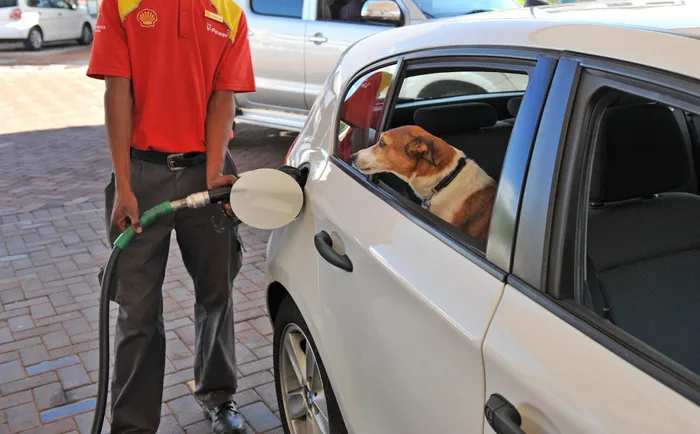Costly Easter despite petrol cut as costs outpace the average consumer
CONSUMERS

A fuel station attendant fills a car with fuel while a dog in the car looks on Prices for 93 and 95 unleaded petrol decreased by 58 cents and 72 cents per litre respectively, taking the price of 93 unleaded to R21.51 and 95 unleaded to R21.62.
Image: Independent Newspapers Archives
The cost-of-living crisis for South Africans has reached alarming levels with fuel prices, despite getting a cut this month, and energy costs quickly outpricing the reach of the average consumer in the country.
This was according to CEO of Debt Rescue, Neil Roets, who told Business Report that hot on the heels of the hefty 12.7% electricity tariff increase that came into effect on 1 April, the small drop in the petrol price announced by the Department of Mineral Resources and Energy (DMRE) will not save the majority of South Africans from a bleak Easter this year.
“Two of the most essential necessities, petrol to drive their vehicles and electricity to heat food and keep the lights on, have slowly but surely become outpriced and beyond the reach of the average citizen,” warns CEO of Debt Rescue Neil Roets.
Prices for 93 and 95 unleaded petrol decreased by 58 cents and 72 cents per litre respectively, taking the price of 93 unleaded to R21.51 and 95 unleaded to R21.62.
Roets added that this is a slap in the face of motorists who have been paying more than R20 per litre for petrol for well over three years now, with prices increasing significantly since January 2021.
“Let’s not forget that the price of petrol increased by around 12 cents and 82 cents per litre in January and February this year, dropping by a miniscule 7 cents per litre in March,” Roets said.
“Even taking into consideration the latest petrol price cut, the reality is that there has been no real relief for motorists at the pumps yet this year and certainly no easing up of their financial burden on any other front.”
A major contributor to the dire situation of South African households, especially those who are still able to afford to buy houses and cars, and those who have credit and store cards is the consistently high interest rate.
Roets added that the current unsustainably high rate of 7.50% reflects a disassociation on the part of the country’s leaders from the day-to-day reality of its citizens.
"This, after the South African Reserve Bank put a pause on cutting interest rates after two months of reprieve, on 19 March of this year. South Africans are in deep trouble, and the warning signs are flashing ever brighter. We are becoming a nation of dependants with middle to upper-income earners drowning in debt and dependent on loans and credit cards, while lower-income earners contend with the double-barrelled threat of hunger and hopelessness,” Roets said.
The Cape Town metro’s proposed ‘Invested in Hope’ Budget for 2025/26 provides a glimmer of hope for lower income households, with planned infrastructure investment over three years which will create over 130,000 construction-related jobs. A full 75% of this investment will directly benefit lower income households.
"It is evident that South Africans are losing hope and confidence that their circumstances can improve. This came through strongly in the latest FNB/BER Consumer Confidence Index (CCI), which has dropped from -6 to -20 index points in the first quarter of 2025. Although a breakdown of the CCI per household shows that sentiment worsened significantly across all income groups, it is especially pertinent among South Africans earning over R20,000 per month - with many now expecting the economy and their finances to worsen over the next 12 months," Roets said.
The BER concured, saying: “The prospect of significantly higher taxes—either via VAT hikes or further bracket creep on personal income tax —likely alarmed many consumers. The return of loadshedding also contributed to the drop in sentiment.”
"With the Easter holidays now just weeks away, South Africans who have been battered by economic headwinds over the past year are looking forward to spending some quality family time together. While some families will be taking a trip to visit friends and family to celebrate the tradition of Easter, for many millions of households there is little to look forward to, other than the possibility of a hearty meal. Others will not even be able to afford to serve up a nutritious meal, as they will need to dig even deeper into their pockets to keep the lights on and pay for essentials like water and transport," Roets added.
“It is deeply concerning that authorities are ignoring the writing on the wall, at this point a VAT hike will be the straw that breaks the camel’s back,” he said.
“My advice to those who cannot break free from their financial constraints is to seek help from a registered debt counsellor who can assist them to manage their financial predicament. This has been a very successful solution for thousands of consumers who are plagued by over-indebtedness,” Roets said.
BUSINESS REPORT